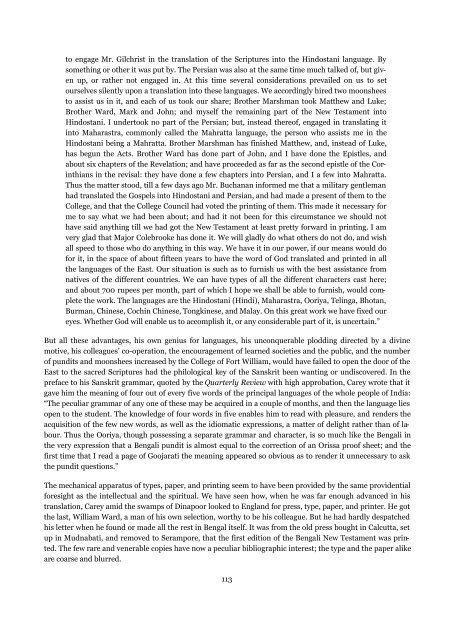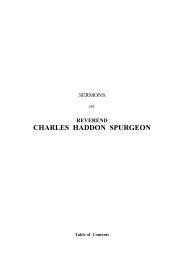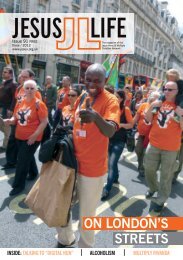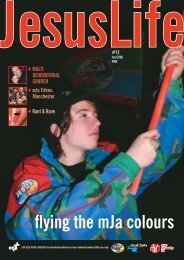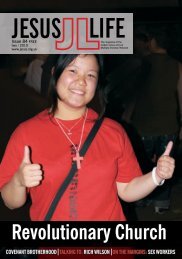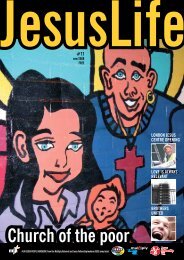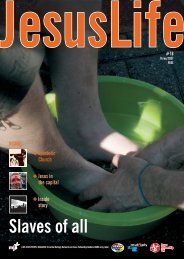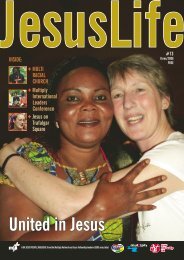Life of William Carey by George Smith - The Jesus Army
Life of William Carey by George Smith - The Jesus Army
Life of William Carey by George Smith - The Jesus Army
Create successful ePaper yourself
Turn your PDF publications into a flip-book with our unique Google optimized e-Paper software.
to engage Mr. Gilchrist in the translation <strong>of</strong> the Scriptures into the Hindostani language. By<br />
something or other it was put <strong>by</strong>. <strong>The</strong> Persian was also at the same time much talked <strong>of</strong>, but given<br />
up, or rather not engaged in. At this time several considerations prevailed on us to set<br />
ourselves silently upon a translation into these languages. We accordingly hired two moonshees<br />
to assist us in it, and each <strong>of</strong> us took our share; Brother Marshman took Matthew and Luke;<br />
Brother Ward, Mark and John; and myself the remaining part <strong>of</strong> the New Testament into<br />
Hindostani. I undertook no part <strong>of</strong> the Persian; but, instead there<strong>of</strong>, engaged in translating it<br />
into Maharastra, commonly called the Mahratta language, the person who assists me in the<br />
Hindostani being a Mahratta. Brother Marshman has finished Matthew, and, instead <strong>of</strong> Luke,<br />
has begun the Acts. Brother Ward has done part <strong>of</strong> John, and I have done the Epistles, and<br />
about six chapters <strong>of</strong> the Revelation; and have proceeded as far as the second epistle <strong>of</strong> the Corinthians<br />
in the revisal: they have done a few chapters into Persian, and I a few into Mahratta.<br />
Thus the matter stood, till a few days ago Mr. Buchanan informed me that a military gentleman<br />
had translated the Gospels into Hindostani and Persian, and had made a present <strong>of</strong> them to the<br />
College, and that the College Council had voted the printing <strong>of</strong> them. This made it necessary for<br />
me to say what we had been about; and had it not been for this circumstance we should not<br />
have said anything till we had got the New Testament at least pretty forward in printing. I am<br />
very glad that Major Colebrooke has done it. We will gladly do what others do not do, and wish<br />
all speed to those who do anything in this way. We have it in our power, if our means would do<br />
for it, in the space <strong>of</strong> about fifteen years to have the word <strong>of</strong> God translated and printed in all<br />
the languages <strong>of</strong> the East. Our situation is such as to furnish us with the best assistance from<br />
natives <strong>of</strong> the different countries. We can have types <strong>of</strong> all the different characters cast here;<br />
and about 700 rupees per month, part <strong>of</strong> which I hope we shall be able to furnish, would complete<br />
the work. <strong>The</strong> languages are the Hindostani (Hindi), Maharastra, Ooriya, Telinga, Bhotan,<br />
Burman, Chinese, Cochin Chinese, Tongkinese, and Malay. On this great work we have fixed our<br />
eyes. Whether God will enable us to accomplish it, or any considerable part <strong>of</strong> it, is uncertain.”<br />
But all these advantages, his own genius for languages, his unconquerable plodding directed <strong>by</strong> a divine<br />
motive, his colleagues’ co-operation, the encouragement <strong>of</strong> learned societies and the public, and the number<br />
<strong>of</strong> pundits and moonshees increased <strong>by</strong> the College <strong>of</strong> Fort <strong>William</strong>, would have failed to open the door <strong>of</strong> the<br />
East to the sacred Scriptures had the philological key <strong>of</strong> the Sanskrit been wanting or undiscovered. In the<br />
preface to his Sanskrit grammar, quoted <strong>by</strong> the Quarterly Review with high approbation, <strong>Carey</strong> wrote that it<br />
gave him the meaning <strong>of</strong> four out <strong>of</strong> every five words <strong>of</strong> the principal languages <strong>of</strong> the whole people <strong>of</strong> India:<br />
“<strong>The</strong> peculiar grammar <strong>of</strong> any one <strong>of</strong> these may be acquired in a couple <strong>of</strong> months, and then the language lies<br />
open to the student. <strong>The</strong> knowledge <strong>of</strong> four words in five enables him to read with pleasure, and renders the<br />
acquisition <strong>of</strong> the few new words, as well as the idiomatic expressions, a matter <strong>of</strong> delight rather than <strong>of</strong> labour.<br />
Thus the Ooriya, though possessing a separate grammar and character, is so much like the Bengali in<br />
the very expression that a Bengali pundit is almost equal to the correction <strong>of</strong> an Orissa pro<strong>of</strong> sheet; and the<br />
first time that I read a page <strong>of</strong> Goojarati the meaning appeared so obvious as to render it unnecessary to ask<br />
the pundit questions.”<br />
<strong>The</strong> mechanical apparatus <strong>of</strong> types, paper, and printing seem to have been provided <strong>by</strong> the same providential<br />
foresight as the intellectual and the spiritual. We have seen how, when he was far enough advanced in his<br />
translation, <strong>Carey</strong> amid the swamps <strong>of</strong> Dinapoor looked to England for press, type, paper, and printer. He got<br />
the last, <strong>William</strong> Ward, a man <strong>of</strong> his own selection, worthy to be his colleague. But he had hardly despatched<br />
his letter when he found or made all the rest in Bengal itself. It was from the old press bought in Calcutta, set<br />
up in Mudnabati, and removed to Serampore, that the first edition <strong>of</strong> the Bengali New Testament was printed.<br />
<strong>The</strong> few rare and venerable copies have now a peculiar bibliographic interest; the type and the paper alike<br />
are coarse and blurred.<br />
113


